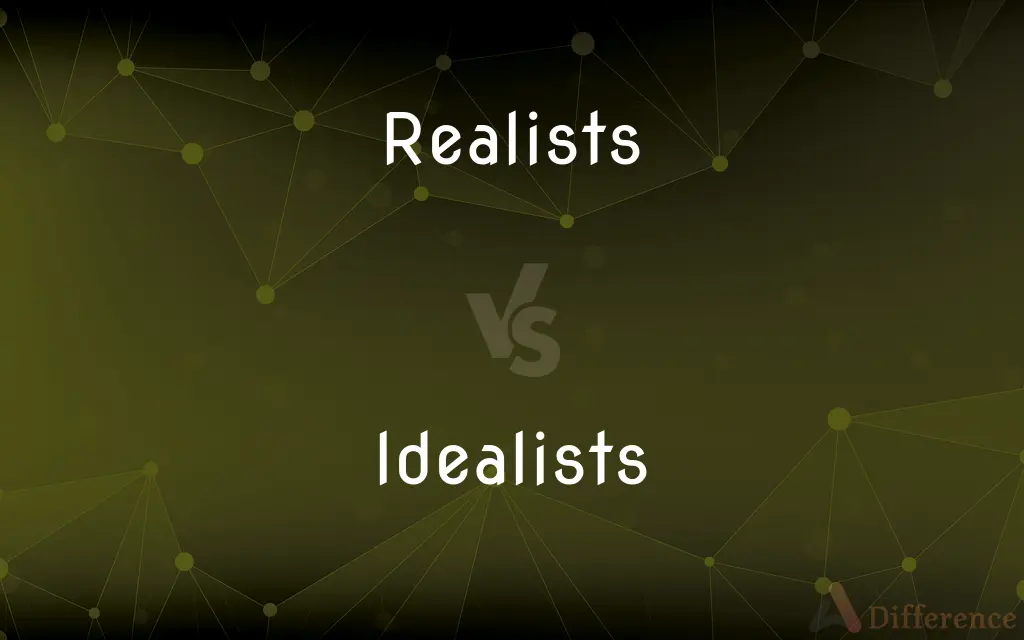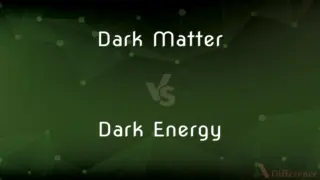Realists vs. Idealists — What's the Difference?
Edited by Tayyaba Rehman — By Urooj Arif — Published on March 16, 2024
Realists focus on practical solutions and existing conditions, prioritizing what is feasible, while idealists aim for what ought to be, often emphasizing ideals and moral values.

Difference Between Realists and Idealists
Table of Contents
ADVERTISEMENT
Key Differences
Realism and idealism represent two distinct approaches to philosophy, politics, ethics, and general life perspectives. Realists prioritize practicality and pragmatism, grounding their decisions and beliefs in the reality of the world as it is. Idealists, on the other hand, are guided by what ought to be. They prioritize ideals, ethics, and moral values, often advocating for change that aligns with their vision of a perfect world, even if such changes seem impractical from a realist perspective.
In the realm of international relations, realists view the world as an anarchic system where states act primarily in their self-interest to ensure survival and power. They believe in power politics and the importance of military strength and diplomacy to secure national interests. Idealists, however, emphasize the role of international law, cooperation, and ethical norms, believing that a more peaceful world can be achieved through mutual understanding and the spread of democratic values.
When it comes to problem-solving, realists are likely to consider the limitations and constraints of the current situation, looking for the most viable solutions. Idealists, while acknowledging current realities, are more inclined to push the boundaries of what is considered possible, often advocating for solutions that embody their higher principles and values, even if those solutions are less immediately attainable.
The debate between realism and idealism also extends to ethics and morality. Realists may argue that moral decisions must be grounded in the context of the situation and the likely outcomes, considering the lesser of evils or the most beneficial results for the greatest number of people. Idealists, conversely, might hold that actions should be judged based on their adherence to moral principles, such as justice, equality, and rights, regardless of the practical outcomes.
Despite these differences, both perspectives offer valuable insights into the complexities of human thought and society. Realists remind us of the importance of acknowledging the world as it is, while idealists inspire us to envision the world as it could be. The interplay between realism and idealism can lead to more balanced approaches to addressing issues, blending practical solutions with aspirational goals.
ADVERTISEMENT
Comparison Chart
Focus
Practical solutions and existing conditions
Ideals and moral values
Approach to Change
Incremental and based on what is feasible
Visionary and based on what ought to be
Worldview
Anarchic, self-interested states in international relations
Cooperation and ethical norms in international relations
Problem-Solving
Considers limitations and seeks viable solutions
Pushes for ideal solutions beyond current limits
Ethics and Morality
Grounded in outcomes and situational context
Based on adherence to universal moral principles
Compare with Definitions
Realists
Prefer incremental changes that are achievable within existing constraints.
Realists advocate for policies that are sustainable and realistically implementable.
Idealists
Individuals who are guided by ideals, focusing on how the world ought to be.
Idealists in politics strive for policies that reflect values of justice and equality.
Realists
Consider moral decisions within the context of likely outcomes and benefits.
Realists might support a policy not because it is ideal, but because it results in the best practical outcome.
Idealists
Believe in the potential for cooperation and ethical progress in international relations.
Idealists support international institutions and laws that promote peace and human rights.
Realists
Individuals who prioritize practicality and pragmatism, focusing on the world as it is.
Realists in politics emphasize the importance of power and security in statecraft.
Idealists
Pursue transformative changes that align with ethical principles, despite practical challenges.
Idealists champion ambitious environmental policies aiming for a sustainable future.
Realists
Tend to see the world in terms of power dynamics and competitive self-interest.
Realists believe that national interests drive international relations.
Idealists
Seek solutions that are morally and ethically aligned with their vision of a better world.
Idealists push for social reforms that address root causes of inequality, even if they are challenging to implement.
Realists
Aim for solutions that are practical and immediately attainable.
In negotiations, realists look for compromises that all parties can realistically accept.
Idealists
Actions are judged based on their adherence to moral and ethical standards.
Idealists often oppose compromises that conflict with their principles, even if those compromises offer practical benefits.
Realists
One who is inclined to literal truth and pragmatism.
Idealists
One whose conduct or thinking is influenced by ideals that often conflict with practical considerations.
Realists
A practitioner of artistic or philosophic realism.
Idealists
An artist or writer whose work is imbued with idealism.
Realists
Plural of realist
Idealists
An adherent of any system of philosophical idealism.
Idealists
Plural of idealist
Common Curiosities
Is one approach better than the other?
Neither approach is inherently better; the effectiveness of realism or idealism depends on the context and the goals being pursued.
How do realists and idealists view human nature?
Realists often have a more skeptical view of human nature, emphasizing self-interest and competition, while idealists tend to have a more optimistic view, believing in the potential for altruism and cooperation.
Can realism and idealism coexist in practice?
Yes, many successful approaches to policy, ethics, and personal decision-making incorporate elements of both realism and idealism to balance practical constraints with aspirational goals.
How does education reflect the divide between realism and idealism?
In education, realists might emphasize practical skills and job readiness, while idealists might focus on developing critical thinking, ethical reasoning, and the pursuit of knowledge for its own sake.
In terms of environmental policy, how do realism and idealism differ?
Realists may prioritize economic and security concerns over environmental issues, advocating for gradual changes. Idealists push for comprehensive environmental policies that address the root causes of climate change, even if they require significant societal shifts.
How do these perspectives influence international policy?
In international policy, realists prioritize national security and power, while idealists focus on promoting global cooperation, peace, and human rights, leading to different strategies and diplomatic approaches.
Can a person's perspective shift from idealism to realism, or vice versa?
Yes, individuals' perspectives can shift due to personal experiences, changes in knowledge, or the influence of societal trends.
Do realists and idealists agree on the role of international organizations?
Realists tend to be skeptical about the effectiveness of international organizations, viewing them as platforms for state interests, while idealists see these organizations as vital for promoting global cooperation and peace.
How do realists and idealists approach conflict resolution?
Realists approach conflict resolution through power balance and pragmatic negotiations, focusing on interests rather than principles. Idealists, however, prioritize ethical considerations and mutual understanding, aiming for solutions that adhere to moral values.
Can an individual's approach to personal relationships be categorized as realist or idealist?
Yes, in personal relationships, realists tend to be pragmatic, focusing on compatibility and practical aspects, while idealists might prioritize ideals such as unconditional love and the perfect partnership.
How do realists and idealists differ in their approach to economic policy?
Realists focus on policies that ensure stability and growth, considering market forces and geopolitical realities. Idealists advocate for economic policies that promote equality, sustainability, and the welfare of all citizens, even if such policies challenge market norms.
In the context of leadership, how do realist and idealist approaches manifest?
Realist leaders tend to make decisions based on pragmatism, focusing on what is achievable and strategically beneficial. Idealist leaders aim to inspire change that aligns with visionary goals and principles, often challenging the status quo to achieve ethical outcomes.
What role does culture play in shaping realist and idealist perspectives?
Culture significantly influences whether societies and individuals lean towards realism or idealism, with historical, social, and political contexts shaping one's worldview and approach to problem-solving.
How do realists and idealists view technological advancement?
Realists may view technological advancement primarily as a means to enhance power and efficiency, whereas idealists might emphasize the potential of technology to solve societal problems and improve human welfare.
How do realists and idealists perceive the concept of justice?
Realists see justice in terms of law and order, focusing on what is enforceable and practical. Idealists, however, advocate for justice that aligns with moral and ethical standards, even if it challenges existing legal frameworks.
Share Your Discovery

Previous Comparison
Dark Matter vs. Dark Energy
Next Comparison
Infrared Cookers vs. Induction CookersAuthor Spotlight
Written by
Urooj ArifUrooj is a skilled content writer at Ask Difference, known for her exceptional ability to simplify complex topics into engaging and informative content. With a passion for research and a flair for clear, concise writing, she consistently delivers articles that resonate with our diverse audience.
Edited by
Tayyaba RehmanTayyaba Rehman is a distinguished writer, currently serving as a primary contributor to askdifference.com. As a researcher in semantics and etymology, Tayyaba's passion for the complexity of languages and their distinctions has found a perfect home on the platform. Tayyaba delves into the intricacies of language, distinguishing between commonly confused words and phrases, thereby providing clarity for readers worldwide.














































